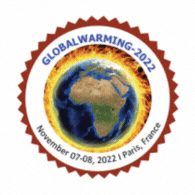
Roberto De vivo
Department of Chemistry and Microbiology, Enrico Fermi Technical Institute, Italy
Title: Influence of carbon fixation on the mitigation of greenhouse gas emissions from livestock activities in Italy and the achievement of carbon neutrality
Biography
Biography: Roberto De vivo
Abstract
Among the greenhouse gas emissions due to livestock activities there is, in addition to rumen methane, that which derives from the fermentation and management of manure from farmed animals. To feed the farmed animals, plants are used that fix carbon and therefore subtract carbon dioxide from the atmosphere. The emissions related to rumen fermentations, those related to manure, management, and spreading of animals of species reared in Italy, as well as manure released by grazing animals were quantified and summed. The emissions due to the respiration of animals were calculated and the carbon dioxide fixed by the main crops of zootechnical interest was calculated and then subtracted from the atmosphere. In addition, the emissions from the cultivation of plant species, attributable to the working of the soil, the production of fertilizers and pesticides, electricity, fuels, and the operation of machines, were also taken into account. The results of this elaboration show that in Italy the CO2 fixed in the vegetation cultivated to feed animals is about 10% higher than the sum of that emitted by the animals reared and by the entire process that is part of it. It could therefore be argued that the influence of carbon fixation should probably be taken into account to calculate the environmental impact in terms of carbon footprint of agricultural and animal products. In this way, carbon neutrality would be demonstrated, which characterizes the production processes of agricultural products and animal productions unlike other production cycles.

